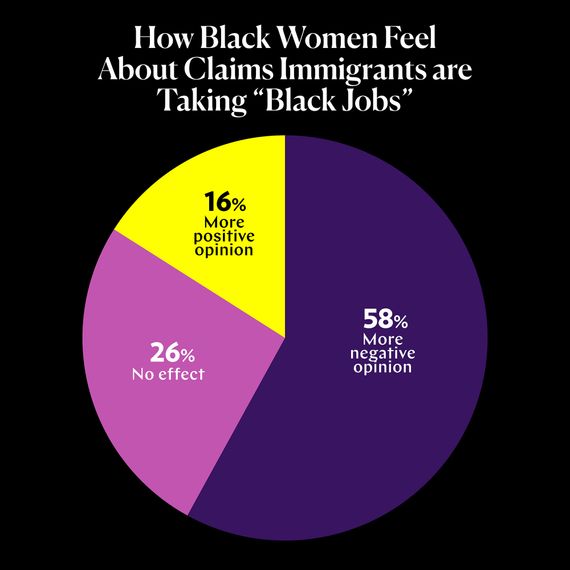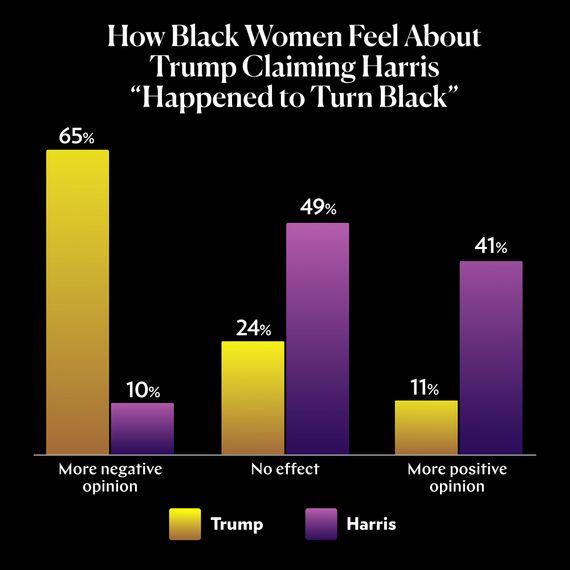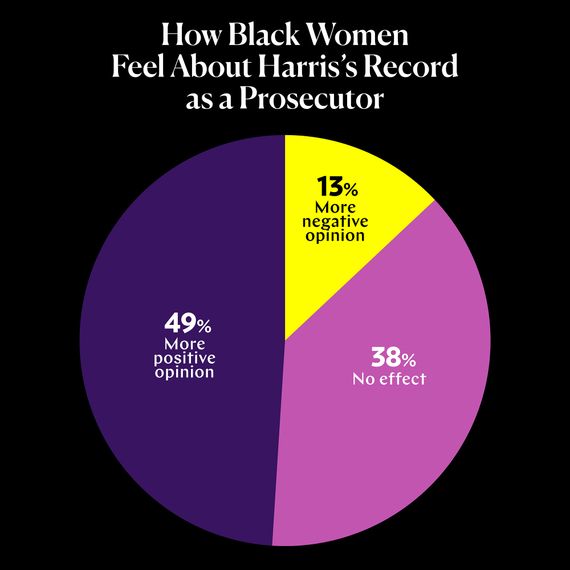
When Kamala Harris ran for president in 2020, her experience as a prosecutor appeared to hurt her with Democratic-primary voters who were moving to the left on criminal-justice issues and labeled her “a cop.” This time around, Harris is leaning into, instead of downplaying, that record, reminding crowds across the country that she knows how to handle “predators, fraudsters, cheaters,” and drawing a sharp contrast between herself and Donald Trump, the first former president to be convicted of crimes. Harris’s positioning herself as a tough prosecutor is a tactic she’s expected to continue to employ in Tuesday’s debate.
This message is also resonating with Black women, according to a new Cut survey that found 49 percent of Black women have a positive opinion of Harris based on her record as a prosecutor. Thirty-eight percent said this background didn’t change their opinion of Harris, while 13 percent said they had a negative view of her because of it.
The survey is the third of four that The Cut is conducting before the November election. It polled 1,200 Black women ages 18 to 55 between August 28 and September 3, following Harris’s official nomination at the Democratic National Convention. While the vast majority of Black women, 91 percent, plan to vote in the 2024 presidential election, those who said they felt an obligation to the Black community to vote declined slightly to 81 percent from 85 percent in August. The percentage of Black women who said they feel pressured to support Harris remains unchanged at 42 percent, while more than two-thirds agree that concerns about whether Americans are ready to elect a Black woman are true or fair.
The share of Black women who said they’d vote for Harris if the election were held today — 83 percent — increased significantly after the DNC, up from 75 percent in August. Thirteen percent said they would vote for Trump if the election were held today. Eighty-three percent of those surveyed said they approve of how Harris is handling her job as vice-president, up from 78 percent in August.
The survey also found a stark enthusiasm gap between Harris and Trump supporters. Seventy-eight percent of Black women who plan to vote for Harris believe their vote will have a positive impact, while 46 percent of Trump supporters believe their vote will have a negative impact or no impact at all, up from 35 percent in August. These positive vibes extended to Harris’s vice-presidential pick, Tim Walz, whom 44 percent of Black women said they view positively, while just 11 percent said they have a positive opinion of Trump’s VP pick, J.D. Vance.
While there’s been a lot of attention paid in recent weeks to Tuesday night’s debate — which will be the first and possibly only chance for Harris and Trump to face off in front of voters — Black women were divided on how much the event would impact their vote. Only 30 percent said the debate will strongly affect whom they vote for, while 42 percent said the debate will have a moderate or minor effect on whom they vote for. Twenty-eight percent said the debate will have no effect on their choice of candidate.
Harris’s prosecutor pitch is resonating.
Before she was elected senator and vice-president, Harris served as California’s attorney general and San Francisco’s district attorney. In her 2009 book, Smart on Crime: A Career Prosecutor’s Plan to Make Us Safer, Harris described herself as a person who was “tough on crime by being Smart on Crime.” A decade later, she began describing herself as a “progressive prosecutor,” even as her critics on the left accused her of failing to embrace criminal-justice reforms. On the campaign trail this summer, however, she began to focus on her record of dealing with violent crime, emphasizing that she’s prosecuted “transnational gangs, drug cartels, and human traffickers.”
This experience appears to be resonating with Black women, 39 percent of whom ranked racial justice and equity and 28 percent of whom ranked public safety and crime as among the most important issues to them. Twenty percent of Black women also said they have personally experienced gun violence or street crime, according to the survey, while 18 percent said they have personally experienced police violence.
Only 14 percent said they believe Black people are treated fairly by the American justice system. The survey also found that Trump’s felony conviction and criminal cases have hurt Black women’s perceptions of him: 69 percent said the cases made them less likely to vote for Trump, up from 61 percent in August.
The economy is increasingly important to Black women.
Forty-eight percent of Black women said inflation and the economy are among the most important issues to them in this election, up from 42 percent last month. Housing, racial justice and equity, health care, and abortion rounded out the top five issues on Black women’s minds heading into November. (And though the share of Black women who ranked racial justice and equity as the most important issues to them has declined since August, 31 percent of Black women now say the country is moving in the right direction on the issue after Harris’s formal nomination, up from 24 percent last month.)
The survey also found that 38 percent of Black women have experienced job loss, 34 percent have dealt with student debt, and 30 percent have faced housing insecurity. Harris has recently begun rolling out economic proposals that address some of these hardships, including building more housing and giving people down-payment assistance. The survey found the share of Black women who said Harris would have the most positive impact on their personal finances increased from 70 percent in August to 80 percent this month. By comparison, just 16 percent of Black women believe Trump would most positively impact their personal finances.
Black women aren’t buying Trump’s attacks.
Even before Harris kicked off her campaign this summer, Trump tried to appeal to Black voters by claiming that the Biden administration has been allowing immigrants into the country who are taking “Black jobs.” Those accusations don’t appear to have helped him, as the survey found the comments gave 58 percent of Black women a more negative view of the former president. Twenty-six percent said the “Black jobs” comments didn’t change their view of Trump, while 16 percent said they had a more positive view of him.


Trump has also launched racist attacks on Harris since she became his opponent, including falsely claiming at the National Association of Black Journalists conference that Harris “happened to turn Black” a few years ago. The attack seems to have backfired with its intended audience, as 65 percent of Black women said the comments about Harris’s race led them to have a more negative view of Trump. Twenty-four percent said the comments didn’t change their opinion of Trump, while 11 percent said they had a more positive view of him.
One of Trump’s more recent tactics — calling Harris “Comrade Kamala” in an attempt to paint the vice-president as a communist — does appear to be sticking with a few voters, however. The survey found 22 percent of Black women agree with the label.



